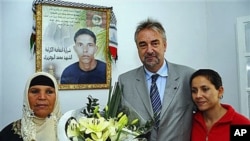Tunisia marks the year anniversary on Saturday, December 17 of the self-immolation of Mohammed Bouazizi, whose act of protest triggered a revolution in the North African country - and the wider popular uprising now known as the "Arab Spring." While Tunisia appears to be heading toward a largely positive future, the outlook for other countries in the region appears less bright.
It was a singular act of defiance by an impoverished, 26-year-old vegetable vendor living in Tunisia's economically depressed heartland. Bouazizi's self-immolation last year on the 17th of December - to express his despair and anger at local authorities - triggered a national uprising that brought down dictator Zine el Abidine Ben Ali a month later.
The protests crossed Tunisia's borders. From Algeria to Yemen, angry people began setting themselves on fire, and the popular revolt we now call the Arab Spring was born. Besides Ben Ali, the leaders of Egypt and Libya have fallen in much bloodier uprisings - and Yemen's President Ali Abdullah Saleh agreed to step down.
Today, Tunisia is fundamentally - and most believe irreversibly - changed. In October, widely praised elections ushered in a new coalition government, with the moderate Islamist Ennahdha party the dominant power.
Retired US diplomat William Jordan, a North Africa expert, gives Tunisia a largely upbeat assessment.
"I think that overall, the trend is positive. Tunisia's new institutions are proving to be much more durable and much more responsive to Tunisians' desire for a more democratic, more open political system - and a decisive break from the Ben Ali regime," said Jordan.
Human Rights Watch's deputy regional director Eric Goldstein also praises Tunisia's evolution over the past year.
"People are free to go out and protest. New newspapers have been created. There's an atmosphere there that's completely different from the state of fear that Ben Ali enforced," said Goldstein.
While Tunisia's revolution was largely peaceful, it has not been painless. The country's key tourism industry and foreign investment plummeted. The uprising in neighboring Libya sent thousands of refugees across the border - and drove Tunisians working there back home. Tunisian immigrants piled up on Europe's shores, desperate for jobs.
Rebooting the economy is one of the biggest challenges facing the new government. Azza Turki, a political journalist for the Tunis-based weekly Realites, said, "Really now, what changes between last year and this year is that the Tunisian citizen is impatient today. He doesn't accept anymore to wait to have a job. He considers he made the revolution to have a better situation, an economic situation, a social situation and he just cannot wait anymore."
The country also faces political problems. The new coalition government already is squabbling. Critics fear the growing power of Ennahdha - and a rollback of women's considerable rights.
Earlier this month, thousands of hardline Islamists and secular activists staged opposing demonstrations in the capital Tunis, underscoring a growing standoff about the role of political Islam in once-secular Tunisia. The Islamists have occupied university campuses, demanding gender segregation and other restrictions - acts Ennahdha has condemned. Human Rights Watch's Eric Goldstein.
"What women are concerned about now, among other things, is this new climate of intolerance that we see in evidence in these protests on campus and other places where women gather to demonstrate in support of their rights, and they're surrounded by men who are insulting them, menacing them and in some cases physically attacking them," said Goldstein.
Journalist Turki is worried about Tunisia's future.
"The situation isn't clear. We don't know how to go, where to go. This government, I don't know what its plan is," he said.
But Mansouria Mokhefi, head of Middle East and North Africa programs at the French Institute for International Relations in Paris, is more sanguine.
Mokhefi predicts the West and Arab Gulf nations, in particular, are determined to make Tunisia's democratic experiment a success - and will offer the economic backing to do so.
Mokhefi also believes the rise of political Islam in Tunisia and elsewhere in the Arab world marks a shift toward a new identity, away from western-style democracy to a Muslim one, even if its future shape is a work in progress.
More worrying, commentators say, is what is happening elsewhere in the Arab world. Former diplomat Jordan recalls another anti-government uprising - in Algeria, where he was last posted - which unleashed a bloodbath in the 1990s that killed roughly 150,000 people.
"Tunisia [is] crucial as proof that you can make a difference, you can break through the door of oppression and you can affect change. But Egypt and Syria will probably be over the longer term, the true test cases… of whether you can make change successfully or whether you run the risk of provoking a more violent, longer-term chaos," said Jordan.
So far, Jordan and other analysts say, Tunisia remains the only Arab Spring success story. Whether Mohammed Bouazizi's desperate act will lead to others remains to be seen.
Tunisia Marks First Anniversary of Uprising
- By Lisa Bryant




